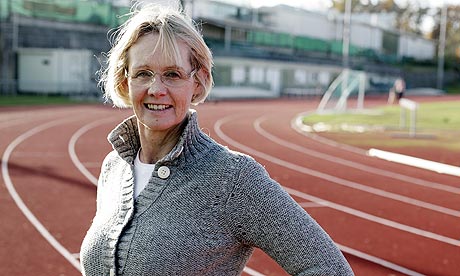
To watch Margot Wells get high on speed at the Guildford Spectrum this week was an experience that bordered on the evangelical. This is the woman with the task of making England's rugby players feel the need for speed and when she speaks about her passion her hands make fists and her eyes shine brightly.
"Speed frightens some people, coaches and players, because how can you tackle what you can't catch?" says the wife of Allan Wells, the 1980 Olympic 100 metres gold medallist. "But it's my comfort zone. I adore it in all its forms. It inspires me. I love the look on people's faces when you run fast. It's exciting. The crowd is excited by it. The players love it."
Wells holds no official position. She deals with individuals and, by word of mouth, her fame has spread. "Right now I'm so busy I make God look lazy but it's great to get up in the morning and know I can make a difference," she says. "I have seven Wasps, three Harlequins, some London Irish and some other club and university players."
She sees 28 rugby players regularly, 10 less routinely and, occasionally, another 10 university and school players. Of the current England squad Wells has coached Danny Cipriani, James Haskell, Riki Flutey and Paul Sackey.
This remarkable coach comes without books and badges and those who have adopted the conventional path to tracksuit and stopwatch may suspect her of a certain quackery. "When I get resentment from some coaches I just say, 'Where's your Olympic gold medal?' They have to respect that I coached the fastest man on the planet and spent the past 30 years working out how I did it. So they're not going to beat me on the speed thing, are they?
"No one seemed to want to know what I knew but they do now. People are seeing that I can help. Just watch my players. Judge me on my players. If I can move James Haskell I can move anything.
"What I teach applies to all sports that involve running. Football thinks it's wonderful but look at Michael Owen. He used to be fast and now he's not. Injuries? Rubbish. Age? Rubbish - unless you're 60. You can't un-fast yourself. It should be a criminal offence to make people slower."
Wells was once a champion sprinter who exasperated her father by asking him why she could run faster than anyone else. "Because you were born like that," he would say. She would ask: "But why was I born like that?" She then subordinated her own career to help her husband win Olympic gold. "It's difficult for there to be two superstars in one household," she says. "One needs to be helping. But I was very good at watching him run. I always had a coach's head, rather than an athlete's head. I knew technically and instinctively what went where and where it should be going when it wasn't. Allan was narcissistic. Selfish doesn't even cover it. But you have to be like that to reach the top."
Allan, now a systems analyst at Surrey University, started working with London Scottish in 1988 and brought Margot in to help. She did so for three years before returning to PE teaching and parenthood but, she said: "It just evolved. Snowballed, really. Guildford Rugby Club, the local school, the phone kept ringing. I was only 27 in 1980. Now I know so much more. Bad spelling jumps out at some people; bad running jumps out at me. Now I have formed my own company, Wellfast."
So what is her method? "I keep everything simple. Sport has become over-technical. It is a myth that some people were just not born fast. I can make anyone faster in five minutes. The trouble is there is no information out there on speed and power. It's my job to spot the physical weakness that prevents someone from running fast. There is too much isolation in sport. Someone does the weights, someone else does this or that. I do it all. I turn strength into power, and power into speed. I do the nutrition, too.
"I think rugby lost the plot a bit. It made people big and slow. But ask the players and they want to be faster, not bigger. I've had prop forwards out there this morning running like the wind."
She would love to get involved in the 2012 London Olympics, for athletics is her "first love". But even after a poor Olympics for Britain "in every event that involved running", the call has not come.
There is a moment in Chariots of Fire when the coach Sam Mussabini (played by Ian Holm) punches a hole in his straw hat when the distant national anthem tells him Harold Abrahams has won 100m gold at the 1924 Olympics. If you are near Guildford tomorrow, a scream of delight might tell you how England are faring against the Wallabies.
Springs in their step
Wasps and England players who have benefited from training sessions with Margot Wells
Danny Cipriani Recovered from a serious ankle injury and is quicker than before. "That has given me particular satisfaction," says Wells
James Haskell A regular visitor to Guildford. Also uses psychologists and the advice of the former All Black No8 Zinzan Brooke
Riki Flutey Partnership with Cipriani gives England more speed at Nos 10 and 12 than ever before
Paul Sackey First worked with Wells while at London Irish and won an England place after moving to Wasps

